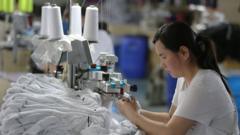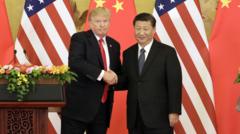In a significant development, U.S. Treasury Secretary Scott Bessent announced that the U.S. has made notable strides in ongoing trade talks with China, which took place over the weekend in Geneva. Further details are expected today as both nations aim to address various trade practices and national security concerns.
Trade Talks Progress: U.S. and China Moving Towards Agreement

Trade Talks Progress: U.S. and China Moving Towards Agreement
U.S. Treasury Secretary cites "substantial progress" in trade negotiations with China, signaling a potential shift in economic relations.
The optimistic dialogue has raised hopes among businesses reliant on U.S.-China trade, yet experts urge caution regarding the outcomes of these brief discussions.
Following extensive trade discussions between the U.S. and China, Treasury Secretary Scott Bessent reported "substantial progress" in the negotiations, igniting anticipation for official announcements expected soon. The meetings, held in Geneva, have led to discussions that may result in a preliminary agreement aimed at easing concerns surrounding U.S. national security in relation to China's trade strategies.
Jamieson Greer, the U.S. trade representative, hinted that while the precise nature of the resulting deal remains unclear, it will likely include a mechanism for both countries to consult further on economic and trade matters. Chinese Vice Premier He Lifeng characterized the discussions as "candid, in-depth, and constructive," emphasizing the groundwork laid for future engagements.
Industry experts express cautious optimism over this news, noting that a reduction in trade tensions could benefit businesses that depend on robust U.S.-China relations. However, as Ana Swanson of The Times remarked, immediate expectations should remain tempered, given that the meetings may yield nothing more substantial than further appointments in the negotiation calendar or a commitment to ongoing communications.
As the world watches these developments closely, the interplay between economic cooperation and trade policy will continue to shape the future of U.S.-China relations.
Following extensive trade discussions between the U.S. and China, Treasury Secretary Scott Bessent reported "substantial progress" in the negotiations, igniting anticipation for official announcements expected soon. The meetings, held in Geneva, have led to discussions that may result in a preliminary agreement aimed at easing concerns surrounding U.S. national security in relation to China's trade strategies.
Jamieson Greer, the U.S. trade representative, hinted that while the precise nature of the resulting deal remains unclear, it will likely include a mechanism for both countries to consult further on economic and trade matters. Chinese Vice Premier He Lifeng characterized the discussions as "candid, in-depth, and constructive," emphasizing the groundwork laid for future engagements.
Industry experts express cautious optimism over this news, noting that a reduction in trade tensions could benefit businesses that depend on robust U.S.-China relations. However, as Ana Swanson of The Times remarked, immediate expectations should remain tempered, given that the meetings may yield nothing more substantial than further appointments in the negotiation calendar or a commitment to ongoing communications.
As the world watches these developments closely, the interplay between economic cooperation and trade policy will continue to shape the future of U.S.-China relations.






















